L45-将来时3种情况 初中英语词性句法新讲课件
文档属性
| 名称 | L45-将来时3种情况 初中英语词性句法新讲课件 | 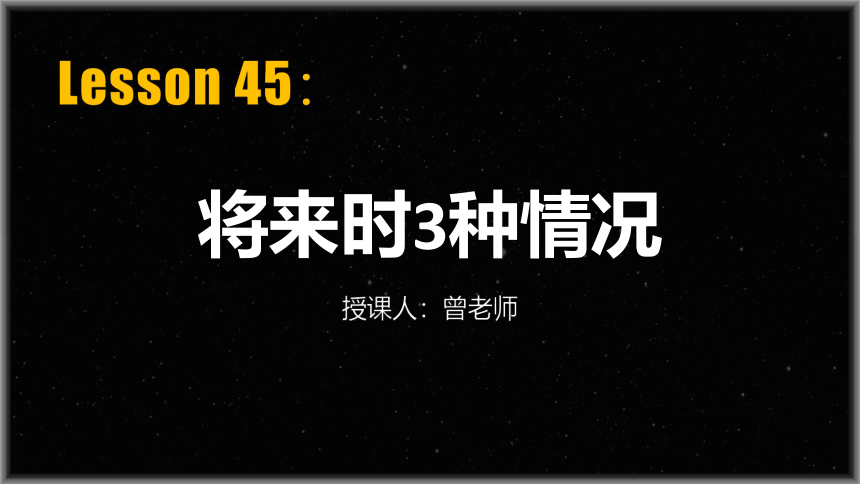 | |
| 格式 | ppt | ||
| 文件大小 | 1.2MB | ||
| 资源类型 | 试卷 | ||
| 版本资源 | 通用版 | ||
| 科目 | 英语 | ||
| 更新时间 | 2022-04-11 09:59:44 | ||
图片预览

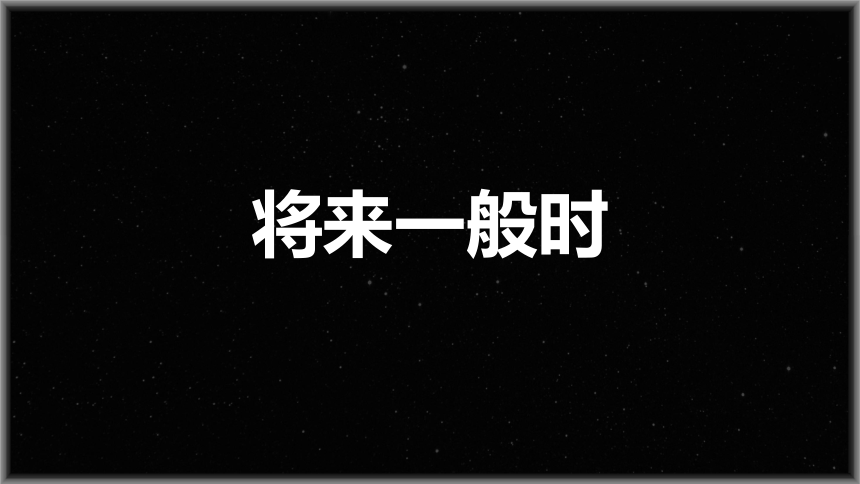
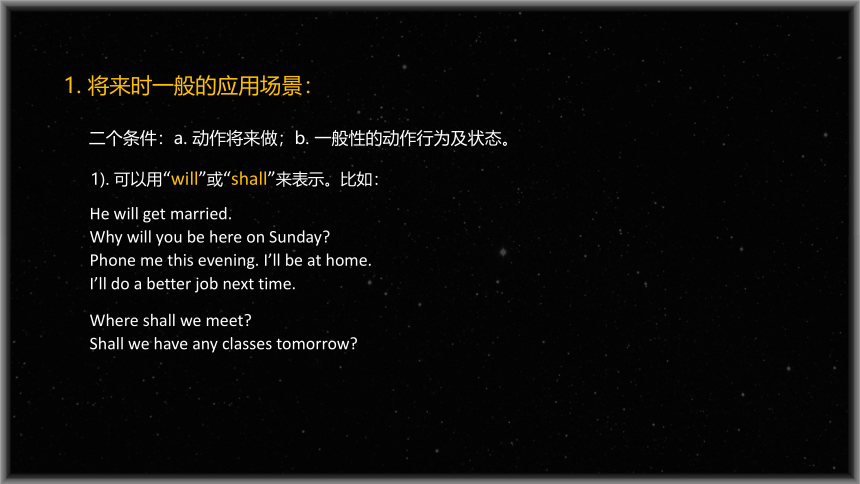
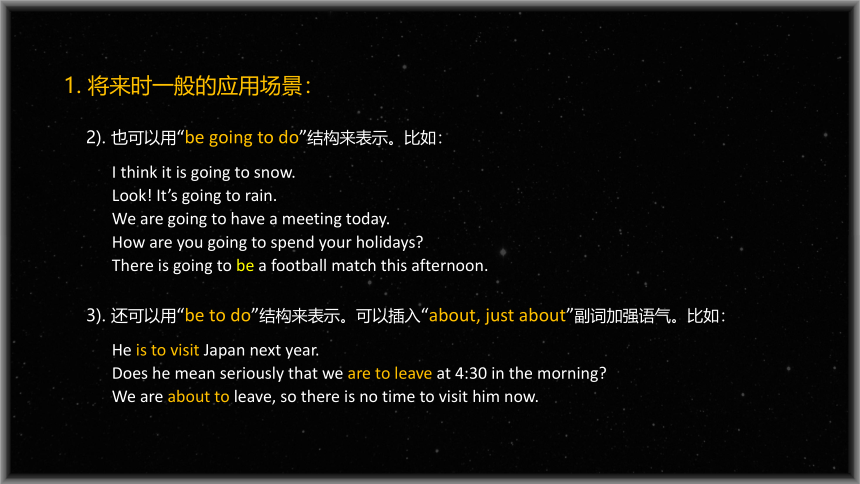
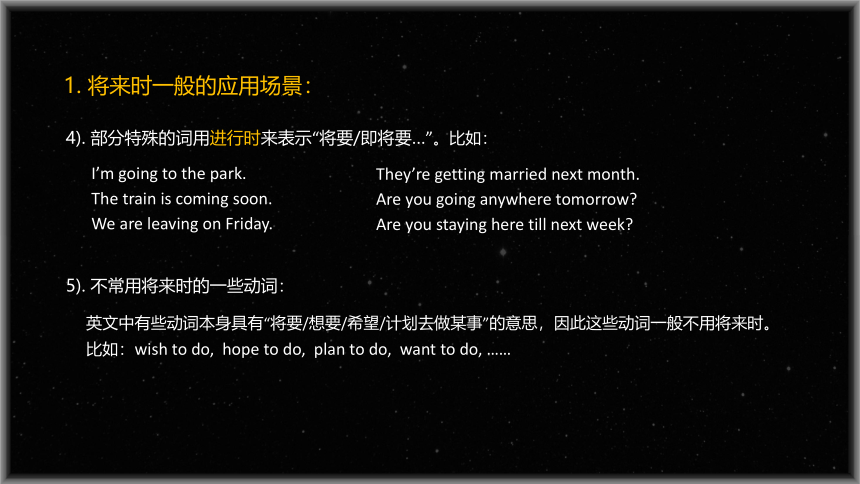
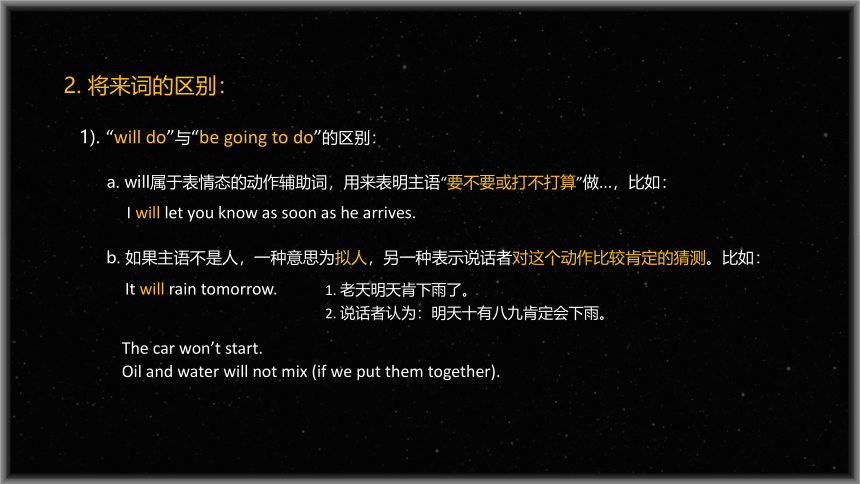
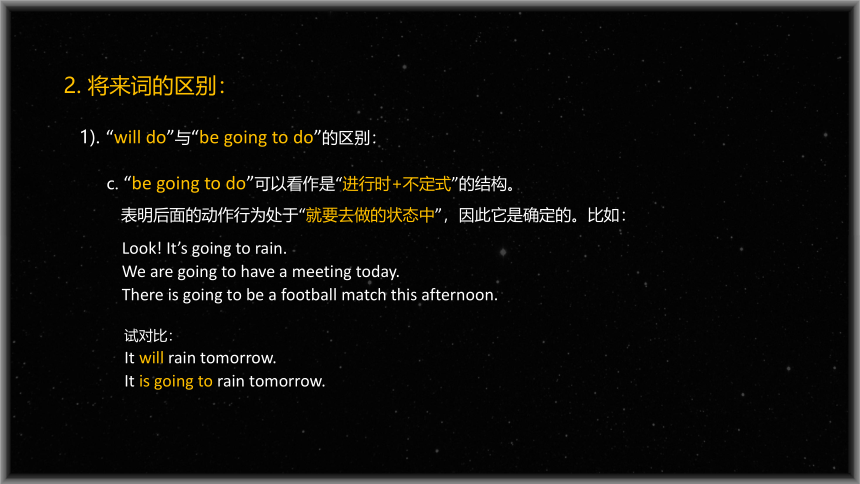
文档简介
(共16张PPT)
将来时3种情况
Lesson 45:
授课人:曾老师
将来一般时
1. 将来时一般的应用场景:
二个条件:a. 动作将来做;b. 一般性的动作行为及状态。
He will get married.
Why will you be here on Sunday
Phone me this evening. I’ll be at home.
I’ll do a better job next time.
Where shall we meet
Shall we have any classes tomorrow
1). 可以用“will”或“shall”来表示。比如:
1. 将来时一般的应用场景:
2). 也可以用“be going to do”结构来表示。比如:
I think it is going to snow.
Look! It’s going to rain.
We are going to have a meeting today.
How are you going to spend your holidays
There is going to be a football match this afternoon.
3). 还可以用“be to do”结构来表示。可以插入“about, just about”副词加强语气。比如:
He is to visit Japan next year.
Does he mean seriously that we are to leave at 4:30 in the morning
We are about to leave, so there is no time to visit him now.
1. 将来时一般的应用场景:
4). 部分特殊的词用进行时来表示“将要/即将要…”。比如:
I’m going to the park.
The train is coming soon.
We are leaving on Friday.
They’re getting married next month.
Are you going anywhere tomorrow
Are you staying here till next week
5). 不常用将来时的一些动词:
英文中有些动词本身具有“将要/想要/希望/计划去做某事”的意思,因此这些动词一般不用将来时。比如:wish to do, hope to do, plan to do, want to do, ……
2. 将来词的区别:
1). “will do”与“be going to do”的区别:
a. will属于表情态的动作辅助词,用来表明主语“要不要或打不打算”做…,比如:
I will let you know as soon as he arrives.
It will rain tomorrow.
b. 如果主语不是人,一种意思为拟人,另一种表示说话者对这个动作比较肯定的猜测。比如:
1. 老天明天肯下雨了。
2. 说话者认为:明天十有八九肯定会下雨。
The car won’t start.
Oil and water will not mix (if we put them together).
2. 将来词的区别:
1). “will do”与“be going to do”的区别:
c. “be going to do”可以看作是“进行时+不定式”的结构。
表明后面的动作行为处于“就要去做的状态中”,因此它是确定的。比如:
Look! It’s going to rain.
We are going to have a meeting today.
There is going to be a football match this afternoon.
试对比:
It will rain tomorrow.
It is going to rain tomorrow.
2. 将来词的区别:
1). “will do…”与“shall do…”的区别:
二个都是表情态的动作辅助词,但所表的情态不同。
“will”侧重经考虑过后“将要这样”, “shall”侧重“应该要这样”
对比句中will与shall的区别:
I will come back, and I shall come back.
I will go to visit him next week.
I shall go to visit him next week.
2. 将来一般时的表现形式:
▲ 英语是绅士语言,也因此在提要求时,“shall”一般只跟第一人称搭配。比如:
What time shall we go there tomorrow
I shall come back in ten minutes.
Shall I take your message to her
对别人提要求时一般这么说:
He must go now. / He has to go now.
You should go now.
如果跟第二或第三人称搭配,“shall”所表达的情态是“说话者”的,而不是句子“主语”的态度。
比如:He shall be rewarded.
将来进行时
1. 将来进行时的应用场景:
(表述者告诉你或跟你强调), 在将来某个时间,某个动作或状态将会正在发生。比如:
Tom will be cutting grass tomorrow.
This time next day they will be sitting in the cinema.
At this time tomorrow, I’ll be lying on the beach.
Please don’t call me between 8:00 and 10:00 tomorrow. I’ll be having my classes then.
Please come tomorrow afternoon, I’ll be having a meeting tomorrow morning.
When he comes to my house tomorrow, I will be writing the report.
I think that she will be working on this experiment until next morning.
Will you be using your bicycle this evening
After you take the medicine, you will be feeling much better.
▲ 能使用将来进行时,才算真正理解并掌握了英语动词的时态。
2. 将来进行时与将来一般时的区别:
用了将来进行时,会让动作更形象具体化,让你感觉那个时候那个动作如临其境般正在发生。
试对比以下句子:
I’ll be seeing Tom tomorrow.
I will see Tom tomorrow.
Stop the child or he will be falling over.
Stop the child or he will fall over.
After you take the medicine, you will be feeling much better.
After you take the medicine, you will feel much better.
When shall we be meeting again
When shall we meet again
将来完成时
将来完成时的应用场景:
1). 表示到将来某个时间点为止,某个动作或状态将已经完成。比如:
They will have been married for 20 years by then.
You will have reached Shanghai by this time tomorrow.
Pick me up at 8 o’clock, I will have had breakfast by then.
We shall/will have learned 12 units by the end of this term.
By the time you get home, I will have cleaned the house from top to bottom.
▲ 时间状语一般常用:by + (将来某时间), …
将来完成时的应用场景:
2). 强调到将来某动作发生之前,另一个动作行为或状态将会已完成。比如:
They will have finished the work before we come back.
We will have known each other for 10 years when I am 50.
Mr. White will have worked for 40 years when he is retired.
3). 在对某个动作行为或状态进行猜测时,也会用将来完成时的结构。比如:
You will have heard of this, I guess.
I am sure that he will have got the information.
Tomorrow we shall have finished the whole thing.
▲ 以上结构类似于:must + have done, may have done, might have done, …
将来时3种情况
Lesson 45:
授课人:曾老师
将来一般时
1. 将来时一般的应用场景:
二个条件:a. 动作将来做;b. 一般性的动作行为及状态。
He will get married.
Why will you be here on Sunday
Phone me this evening. I’ll be at home.
I’ll do a better job next time.
Where shall we meet
Shall we have any classes tomorrow
1). 可以用“will”或“shall”来表示。比如:
1. 将来时一般的应用场景:
2). 也可以用“be going to do”结构来表示。比如:
I think it is going to snow.
Look! It’s going to rain.
We are going to have a meeting today.
How are you going to spend your holidays
There is going to be a football match this afternoon.
3). 还可以用“be to do”结构来表示。可以插入“about, just about”副词加强语气。比如:
He is to visit Japan next year.
Does he mean seriously that we are to leave at 4:30 in the morning
We are about to leave, so there is no time to visit him now.
1. 将来时一般的应用场景:
4). 部分特殊的词用进行时来表示“将要/即将要…”。比如:
I’m going to the park.
The train is coming soon.
We are leaving on Friday.
They’re getting married next month.
Are you going anywhere tomorrow
Are you staying here till next week
5). 不常用将来时的一些动词:
英文中有些动词本身具有“将要/想要/希望/计划去做某事”的意思,因此这些动词一般不用将来时。比如:wish to do, hope to do, plan to do, want to do, ……
2. 将来词的区别:
1). “will do”与“be going to do”的区别:
a. will属于表情态的动作辅助词,用来表明主语“要不要或打不打算”做…,比如:
I will let you know as soon as he arrives.
It will rain tomorrow.
b. 如果主语不是人,一种意思为拟人,另一种表示说话者对这个动作比较肯定的猜测。比如:
1. 老天明天肯下雨了。
2. 说话者认为:明天十有八九肯定会下雨。
The car won’t start.
Oil and water will not mix (if we put them together).
2. 将来词的区别:
1). “will do”与“be going to do”的区别:
c. “be going to do”可以看作是“进行时+不定式”的结构。
表明后面的动作行为处于“就要去做的状态中”,因此它是确定的。比如:
Look! It’s going to rain.
We are going to have a meeting today.
There is going to be a football match this afternoon.
试对比:
It will rain tomorrow.
It is going to rain tomorrow.
2. 将来词的区别:
1). “will do…”与“shall do…”的区别:
二个都是表情态的动作辅助词,但所表的情态不同。
“will”侧重经考虑过后“将要这样”, “shall”侧重“应该要这样”
对比句中will与shall的区别:
I will come back, and I shall come back.
I will go to visit him next week.
I shall go to visit him next week.
2. 将来一般时的表现形式:
▲ 英语是绅士语言,也因此在提要求时,“shall”一般只跟第一人称搭配。比如:
What time shall we go there tomorrow
I shall come back in ten minutes.
Shall I take your message to her
对别人提要求时一般这么说:
He must go now. / He has to go now.
You should go now.
如果跟第二或第三人称搭配,“shall”所表达的情态是“说话者”的,而不是句子“主语”的态度。
比如:He shall be rewarded.
将来进行时
1. 将来进行时的应用场景:
(表述者告诉你或跟你强调), 在将来某个时间,某个动作或状态将会正在发生。比如:
Tom will be cutting grass tomorrow.
This time next day they will be sitting in the cinema.
At this time tomorrow, I’ll be lying on the beach.
Please don’t call me between 8:00 and 10:00 tomorrow. I’ll be having my classes then.
Please come tomorrow afternoon, I’ll be having a meeting tomorrow morning.
When he comes to my house tomorrow, I will be writing the report.
I think that she will be working on this experiment until next morning.
Will you be using your bicycle this evening
After you take the medicine, you will be feeling much better.
▲ 能使用将来进行时,才算真正理解并掌握了英语动词的时态。
2. 将来进行时与将来一般时的区别:
用了将来进行时,会让动作更形象具体化,让你感觉那个时候那个动作如临其境般正在发生。
试对比以下句子:
I’ll be seeing Tom tomorrow.
I will see Tom tomorrow.
Stop the child or he will be falling over.
Stop the child or he will fall over.
After you take the medicine, you will be feeling much better.
After you take the medicine, you will feel much better.
When shall we be meeting again
When shall we meet again
将来完成时
将来完成时的应用场景:
1). 表示到将来某个时间点为止,某个动作或状态将已经完成。比如:
They will have been married for 20 years by then.
You will have reached Shanghai by this time tomorrow.
Pick me up at 8 o’clock, I will have had breakfast by then.
We shall/will have learned 12 units by the end of this term.
By the time you get home, I will have cleaned the house from top to bottom.
▲ 时间状语一般常用:by + (将来某时间), …
将来完成时的应用场景:
2). 强调到将来某动作发生之前,另一个动作行为或状态将会已完成。比如:
They will have finished the work before we come back.
We will have known each other for 10 years when I am 50.
Mr. White will have worked for 40 years when he is retired.
3). 在对某个动作行为或状态进行猜测时,也会用将来完成时的结构。比如:
You will have heard of this, I guess.
I am sure that he will have got the information.
Tomorrow we shall have finished the whole thing.
▲ 以上结构类似于:must + have done, may have done, might have done, …
同课章节目录
- 词法
- 名词
- 动词和动词短语
- 动词语态
- 动词时态
- 助动词和情态动词
- 非谓语动词
- 冠词
- 代词
- 数词和量词
- 形容词副词及其比较等级
- 介词和介词短语
- 连词和感叹词
- 构词法
- 相似、相近词比较
- 句法
- 陈述句
- 一般疑问句和否定疑问句
- 特殊疑问句及选择疑问句
- 反意疑问句
- 存在句(There be句型)
- 宾语从句
- 定语从句
- 状语从句
- 主谓一致问题
- 简单句
- 并列句
- 复合句
- 主谓一致
- 主、表语从句
- 名词性从句
- 直接引语和间接引语
- 虚拟语气
- 感叹句
- 强调句
- 倒装句
- 祈使句
- 句子的成分
- 句子的分类
- 题型专区
- 单项选择部分
- 易错题
- 完形填空
- 阅读理解
- 词汇练习
- 听说训练
- 句型转换
- 补全对话
- 短文改错
- 翻译
- 书面表达
- 任务型阅读
- 语法填空
- 其他资料
